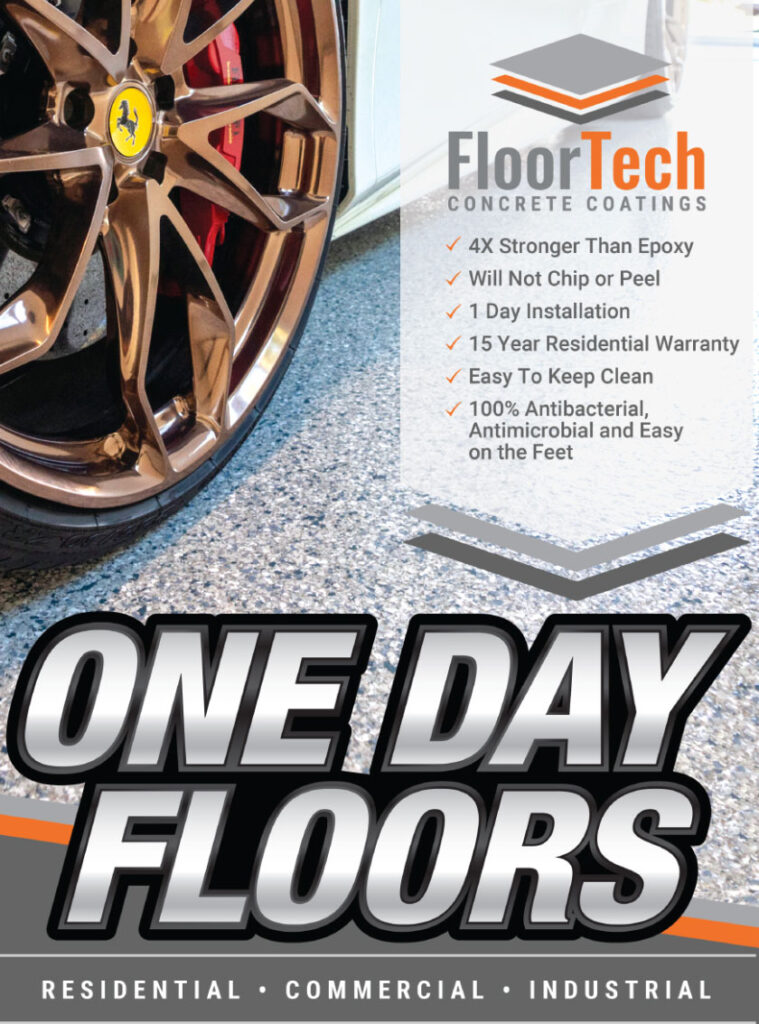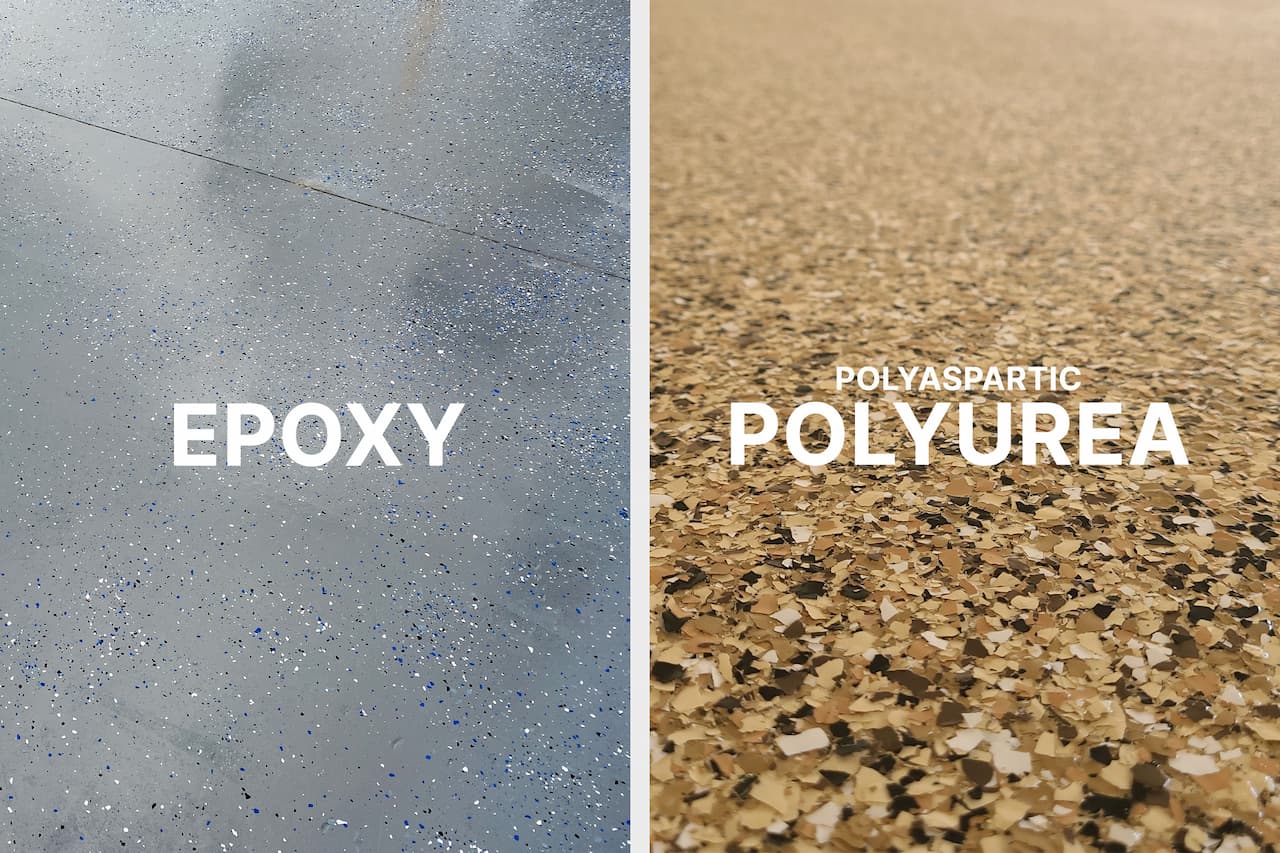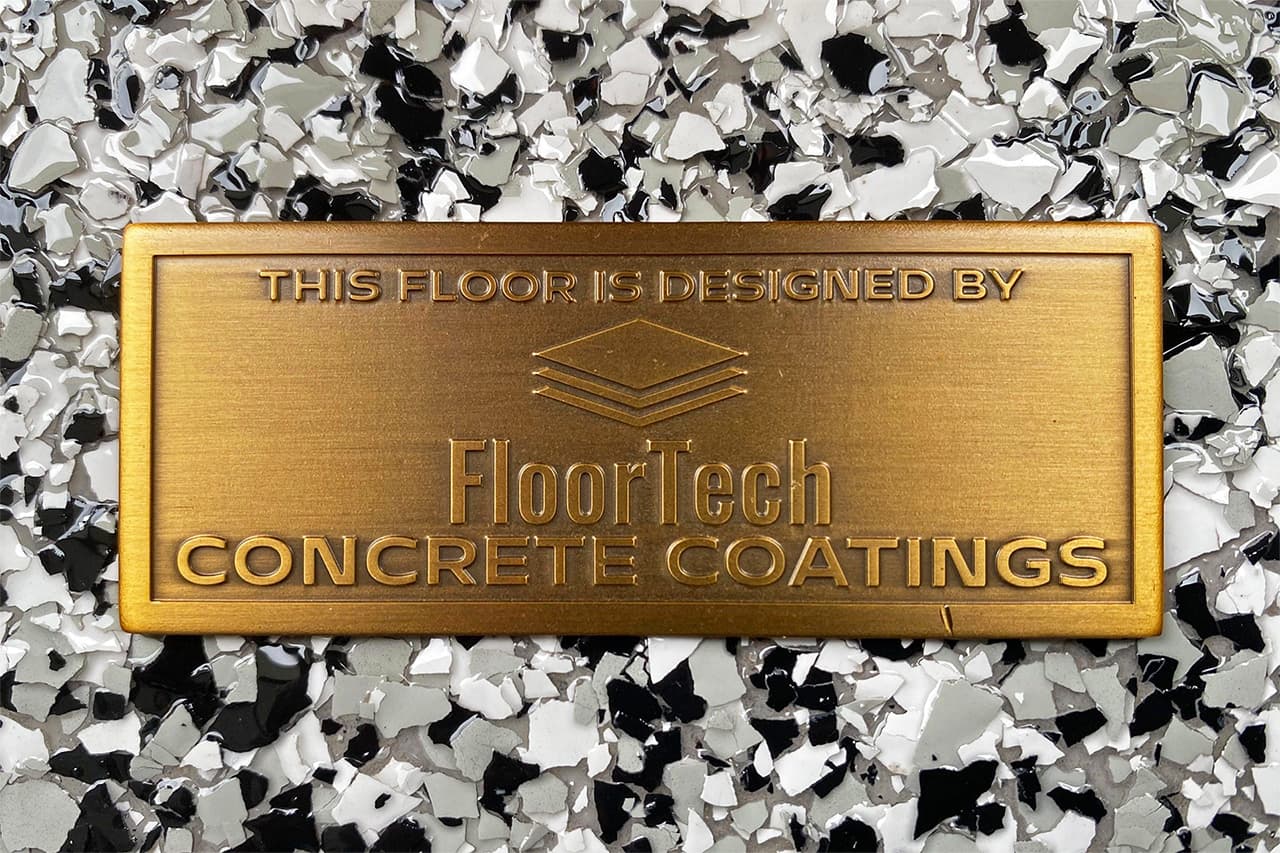1-Day Concrete Floor Coatings for Lifetime Value

From basements to pool decks, our wide-ranging selection of floor coatings guarantees the right look and functionality for any space.
Call or Click today to take advantage of seasonal savings on your next garage floor project!
Check out extensive guide below where we answers questions like:
You’re not alone. The debate between epoxy, polyurea, and polyaspartic coatings is a hot topic among homeowners and professionals alike. This guide dives deep, not just into the technical nitty-gritty aspects of concrete coating options but also into the real-life experiences and reviews of those who’ve treated these paths before. Let’s dive deep into the nuances of these popular concrete coatings and provide clarity on their benefits and differences.

Epoxy is a special type of polymer, much like the material behind the stretch in rubber bands or the resilience in some shoe soles. This elasticity and toughness are what make it a popular choice for home-based projects, particularly on surfaces that see a lot of use.
For concrete coatings, epoxy offers a fairly robust protection. Unlike some coatings that bond deeply, epoxy mainly rests on the surface without penetrating far into the concrete. This coating is formed from two main ingredients: a resin and a hardener. When combined, their effect is much like the clear coat on a wooden tabletop — they bring out a shine while also offering protection.
Polyurea is a unique elastomer, kind of like the material that makes waterproof raincoats effective or the flexibility in a durable garden hose. It’s this blend of water resistance and adaptability that has made polyurea a standout choice for diverse applications, especially in homes and outdoor areas.
When it comes to concrete coatings, polyurea offers more than just surface-level protection. It forms a tenacious bond with the concrete, providing deeper protection than some other coatings. The magic of polyurea is in its two main components that, when mixed together, result in a fast-setting and extremely durable coating. Think of it as the tough protective sleeve for a new smartphone, one that is almost permanently attached to the surface and not only enhances the look but also safeguards against the unexpected for a lifetime.
Think of polyaspartic as a type of polyurea, but with a slower setting time. This slow-down allows for easier and more flexible application, making it a preferred choice for top layers. However, using polyaspartic directly on raw concrete can pose challenges. It doesn’t bond as deeply with concrete as some other coatings, which might lead to durability concerns over time.
Aromatic polyurea, valued for its durability and resistance since the 1980s, has become a go-to for protective coatings in various applications. It excels as a basecoat, providing a strong, resilient foundation. However, it does have a tendency to change color when exposed to sunlight. Despite maintaining its physical integrity in these conditions, it’s typically not recommended as a topcoat.
The opposite of its aromatic cousin, aliphatic polyurea retains its color well under sunlight. With a shiny finish, it’s an excellent choice for the final or topcoat, enhancing the space’s look while providing protection.
When it comes to top-tier concrete coatings, Penntek’s Pure Polyurea stands out. Comprising an aromatic polyurea basecoat paired with a polyaspartic aliphatic polyurea topcoat, it’s an investment in both cost and performance. By combining the robust properties of an aromatic basecoat with the UV resistance and glossy aesthetics of an aliphatic topcoat, Penntek offers a solution that’s both beautiful and durable.
Compared to traditional epoxy, Pure Polyurea boasts being four times stronger and ten times more flexible. This means it’s resilient to chipping, cracking, or peeling, even under strenuous conditions or temperature fluctuations. The secret behind its durability is its rapid curing process and its unique ability to form a deep chemical bond with concrete.
When thinking about how coatings stick to surfaces, imagine them as seals. Some coatings, like Penntek’s polyurea, bond deeply and closely with the surface, almost becoming a part of it. This strong bond means it sticks really well and won’t come off easily. On the other hand, coatings like epoxy sit more on the surface, making them more prone to chipping or peeling. In simple terms, Penntek’s polyurea forms a tighter, stronger bond than many other coatings.
To empirically test the strength of polyurea’s bond, one can use an elcometer. This device gauges the force required to detach a coating, measured in pounds per square inch (PSI). While the industry benchmark for a good bond stands at 500 PSI, Penntek’s Pure Polyurea astoundingly withstands forces up to 1350 PSI. Often, it’s the concrete that gives way before the polyurea does, as demonstrated in Penntek’s Adhesion Test video:
Epoxy is a readily available product at local hardware stores and is often seen as a DIY-friendly option. It generally costs between $3-7 per sq ft, with some premium options going up to $12 per sq ft. Polyurea, due to its durability and longevity, comes at a higher price point. For instance, a typical single-bay garage polyurea coating costs around $2,000, which translates to $7-12 per sq ft. Though pricier than epoxy, polyurea offers longevity and durability that ensure value for money.
Epoxy coatings tend to last between three to five years before signs of wear and deterioration become apparent. Over time, if your garage sees frequent use, the heat from car tires can wear down epoxy, and UV heat can cause it to yellow outdoors. In contrast, polyurea, with its enhanced durability, can have a life expectancy of about 15 years, possibly lasting over a decade longer than epoxy.
Epoxy has made a name for itself in the market for its availability and durability when compared to alternatives like epoxy paint. Epoxy can endure normal wear and tear of concrete floors better than epoxy paint. However, continuous use and exposure to elements like heat, moisture buildup in concrete, and sunlight can degrade epoxy over time.
Polyurea handles this much better. Being an elastomer it bonds almost permanently to concrete and offers superior durability and flexibility to account for natural concrete movement over time. It resists chemicals better too, and can withstand higher temperatures than epoxy, making it a more robust choice, especially in Virginia where winters can be cold, and summers hot.
Epoxy can be applied to concrete, provided the surface is well-prepared, either through sanding or acid etching. While the latter is a popular method, it can be hazardous and possibly damaging to the concrete if done incorrectly.
On the other hand, for a Penntek polyurea coating, the process involves filling any imperfections in the concrete, potentially adding a densifier, and then grinding the surface to ensure an even application. Proper preparation is crucial for both coatings to ensure longevity. As an official Penntek dealer in Virginia, we are highly trained to repair your concrete before applying our superior polyurea coating.
When considering a DIY approach to concrete coatings, many homeowners lean towards epoxy. Its wide availability in both local and online stores makes it an appealing choice for those inclined towards DIY projects. However, diving into such a project requires a meticulous understanding of the manufacturer’s guidelines. Here are a few things to consider:
If a weekend-long DIY project feels overwhelming, seeking professional help is a sensible choice.
Penntek dealers like FloorTech offer top-tier pure polyurea coatings directly sourced from the manufacturer, ensuring you receive a product superior to any store-bought kits. Coupled with industrial-grade equipment and Penntek training and certification, we guarantee a robust application but also save homeowners from potential DIY pitfalls.
Remember, while the upfront cost of professional coatings might seem steep, it’s an investment in quality, durability, and peace of mind. The choice between DIY and professional application ultimately boils down to your comfort level, experience, and the desired outcome.
When I’m about to make an investment, especially something as significant as a concrete coating project, I always research and check out real reviews. What do actual people say about their experiences?
Here is what real people say about “Polyurea vs epoxy, which coating is best for garage floor” on reddit:
“I did epoxy in my last house, very easy, a lot of prep. I failed to do a top coat and regretted it. No major defects, but could notice a difference. New house now and thinking about doing poly, specifically rock solid kit from rustoleum. I believe it is supposed to be more durable. I had concrete poured recently so waiting until it completely cures.”
OmarBell2020 posted about 6 month ago
“Just got a quote in texas for 3700. Going with polyurea/aspartic. Make sure if you use someone or do it yourself you test the moisture content of your concrete. Looked at doing it myself and after purchasing all the equipmant and renting tools i woulda had to pay roughly 1200 so i just figured hire a pro and have it done in a day vs 2 weekends lol”
thejuanandonlytrump posted about 6 month ago
Nearly five years ago, a user posed a question on Reddit, “Getting bids for our two-car garage floor. Some offer Epoxy while others suggest Polyurea. Does anyone have firsthand experience comparing the two? Any pointers on what to look out for when getting bids?”
Torys42 replied saying:
“I went with Polyurea after a lot of research, found that Epoxy typically wears faster and has a higher chance of pop outs… Epoxy traps moisture below the cement slab, and eventually that moisture finds it’s way out in the form of bits of concrete popping out/through the epoxy. Polyurea actually bonds with moisture, so virtually no pops, bonds super hard and shows less wear. I’m super happy with my floor. I live in MN, so we experience a wide range of temps. I’ve had it down for three years and it cleans up really well despite the salt/snow/freezing/thawing.”
Lastly, let’s hear from one of our satisfied customers, Rachael, who remarked just 9 months ago:
“The best service experience I have EVER had. Sorin is very polite, yet professional. He managed the various crews that it took to make this happen. My garage floor looks amazing. Painless for me! HIGHLY Reccommend!”
For more testimonials, take a look at our reviews on Google and other platforms. We pride ourselves on every installation we undertake. We’re not just here to provide a service, but to ensure our customers get the best. We’ll guide you, address any concerns, and help design the floor you’ve always dreamt of.
Although epoxy garage floor offers initial cost savings, polyurea emerges as the superior choice in terms of overall performance and long-term cost-effectiveness, owing to its durability and lower maintenance requirements. The decision between epoxy and polyurea ultimately hinges on your needs. Go with polyurea if want a long-lasting, durable coating with minimal upkeep. Alternatively, if you’re pursuing a shorter-term solution or operating on a tighter budget – epoxy might suit your needs. For those with the requisite skills and time, a DIY approach could also be considered.
Regardless of the coating choice, quality installation is paramount.

Here at FloorTech Concrete Coatings we strive to provide lasting results with our Penntek’s polyurea offerings. And our work is backed by product and service limited lifetime warranty to ensure your peace of mind. We provide floor coating services for residential and commercial applications in Virginia, USA.
Alexandria
Annandale
Arlington
Ashburn
Bowling Green
Burke
Caroline County
Centreville
Chantilly
Culpeper County
Dale City
Fairfax
Falls Church
Fauquier County
Fredericksburg
Gainesville
Great Falls
Hanover County
Herndon
King George County
Lake Anna
Langley
Leesburg
Lorton
Loudoun County
Luisa
Manassas
Manassas Park
McLean
Mt Vernon
Prince William County
Reston
Spotsylvania County
Springfield
Stafford County
Sterling
Tysons
Vienna
Warenton
Woodbridge

Choose our #1 concrete coating to provide you with attractive, low-maintenance, and durable floors for high-traffic areas.
COPYRIGHT © 2024 FloorTech Concrete Coatings | ALL RIGHTS RESERVED.
Send a message, and we will get back to you as soon as we can.
We are here to resolve your doubts or concerns.